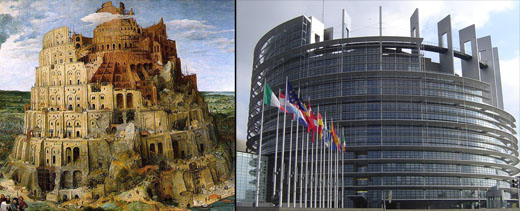This post is part of our series of summaries of works in progress presented at the 6th ADRRN Roundtable held in Dunedin in December 2017.

“How small, of all that human hearts endure,
That part which laws or kings can cause or cure”
Oliver Goldsmith The Traveller
For thousands of years humankind has used language to co-operate in the development of communities, societies and civilizations. Numerous language scholars including Chomsky[1], Tomasello[2] and Pinker[3], have proffered theories about the development of language but its true origins remain hidden in the mists of time. An Old Testament biblical text tells the story of the ancient inhabitants of Babylon co-operating in the construction of a tower so tall and magnificent that it would reach up into the heavens and give them direct access to God. According to the legend, God was so enraged by their attempt to usurp his authority that he made each of them speak a different language so that they could no longer understand or communicate with each other and their construction efforts were frustrated.
The story inspires reflection on the extent to which we depend on language in our relationships with others in society whether at the personal, community or international level. My paper that I workshopped at the ADRRN round table in New Zealand takes up this theme and considers, by reference to some of the recent language literature and to my PhD research data, how language influences human relationships and its capacity for peace making and conflict resolution. It uses examples taken from various historical settings to illustrate how language has informed human behaviour in significant and powerful respects. It concludes that dispute resolution best practice has recognized and implemented appropriate strategies for reframing poor communication techniques, but some of those practices are yet to achieve universal acceptance in some areas of mediation especially where the process is being conducted in connection with litigation.
There is another more recent story, this time from the New Testament history of early Christianity, in which the disciples of Christ stood on a balcony in Jerusalem at Pentecost time preaching to hordes of visitors who had gathered in Jerusalem from the whole of the then known world. According to the legend, although the speakers addressed their homily in Hebrew, each of the visitors was able to hear the speaker in his own tongue, thereby completing a perfect line of communication. I have concluded in my paper that, whilst we have done much as dispute resolution practitioners to advance the cause of peace and conflict resolution through addressing language issues and reframing toxic, negative and unhelpful language, there is still work to be done and our journey from Babylon to Pentecost is not yet over.
One of the language barriers that I perceive is between the dispute resolution field and the legal profession. What is of concern in the dispute resolution narrative is that the significant advantages which continue to accrue to disputants by learning the skills of respectful discourse and positive problem-focused communication, so familiar to dispute resolution practitioners, do not yet appear to have been successfully communicated to (or adopted by) the legal profession to where, paradoxically, many disputants first turn for a solution to their disputes. As recently as this week (14th December, 2017), during a speech addressing justice issues arising from the Royal Commission into Institutional Responses to Child Sexual Abuse, the Royal Commissioner, Justice McClelland, referred disparagingly to lawyers as a potential source of redress for survivors of child abuse. He said:
“In some cases the aggressive hand of the lawyer was engaged, ensuring that an appropriate and just response to a survivor was not possible.”[4]
The clear inference from the Royal Commissioner’s remarks is that engagement of a lawyer, far from facilitating access to justice, ensures that just outcomes are impossible. Like the builders in the Tower of Babel legend, the suggestion is that clients and dispute resolution practitioners are speaking to lawyers but they either do not understand us or they do not wish to hear. The challenge for us, it seems, is to establish effective lines of communication and to speak persuasively so that they are convinced of the necessity for principled dispute resolution solutions. Only then will our journey have been completed.
This paper is very much in draft form and in need of significant work. When it has been completed it is my hope that it will be submitted for publication in a peer reviewed journal such as the Australasian Dispute Resolution Journal.
[1] N Chomsky Powers and Prospects: Reflections on Human Nature and the Social Order (London, 1996, Pluto Press p.30)
[2] M Tomasello, B Velischkovskii, D M Rumbaugh (eds) The Cultural Roots of Language Communicating meaning: The Evolution and Development of Language Mahwah, N.J.: L. Erlbaum. ISBN 978-0-8058-2118-5. OCLC
[3] S. Pinker, P Bloom (1990). “Natural language and natural selection”. Behavioral and Brain Sciences. 13 (4): 707–784. doi:10.1017/S0140525X00081061.
[4] As reported in the Newcastle Morning Herald on 15th December, 2017 at p 6

Pingback: The power of language in dispute resolution – R3 Resolutions